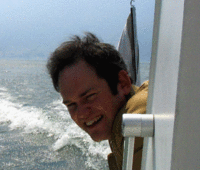Simon Godsill, University of Cambridge
Incorporation of stochastic behaviour and intent into multiple object dynamical systems
In this talk I will describe recent methods and applications for high-level inference and tracking of multiple object, groups and networks, by incorporation of behavioural interactions and unobserved intent into the dynamical models. The idea here is to extend the standard multiple object tracking paradigm to one in which we may automatically learn dynamic interactions between those objects, as well as infer possible intentionalities of the objects. Our models are based on principles from animal behavioural analysis in which objects follow patterns of behaviour based loosely upon what their neighbours in the group are doing, and upon the (unknown) intentionality of the group, for example its final destination. We may also learn more complex interactions such as whether one member of the group is a `leader' of the dynamics and how the objects are split between different groupings. Models are typically formulated in continuous time, and inference is carried out on-line using numerical Bayesian filtering strategies, implemented with state of the art methods such as particle filters and Markov chain Monte Carlo. Applications will be presented from the areas of vehicle tracking, wild animal pack hunting behaviour analysis, financial time series, and finally applications in User Interfaces for automobiles in which the task is to determine accurately and rapidly the intended icon a user is pointing at on a screen, based on the trajectory of hand motion near to the screen, and in the presence of disturbances from suspension and road surface.

Simon Godsill is Professor of Statistical Signal Processing in the Engineering Department at Cambridge University. He is also a Professorial Fellow and tutor at Corpus Christi College Cambridge. He coordinates an active research group in Signal Inference and its Applications and is Head of the Signal Processing and Communications Laboratory at Cambridge. His group specialises in Bayesian computational methodology, multiple object tracking, audio and music processing, and financial time series modeling. A particular methodological theme over recent years has been the development of novel techniques for optimal Bayesian filtering and smoothing, using Sequential Monte Carlo or Particle Filtering methods. Prof. Godsill has published extensively in journals, books and international conference proceedings, and has given a number of high profile invited and plenary addresses at conferences such as the Valencia conference on Bayesian Statistics (twice), the IEEE Statistical Signal Processing Workshop, the Conference on Bayesian Inference for Stochastic Processes (BISP), the IEEE Workshop on Machine Learning in Signal Processing (2013) and FUSION (2016). He co-authored a Springer text Digital Audio Restoration with Prof. Peter Rayner in 1998. He was technical chair of the IEEE NSSPW workshop in 2006 on sequential and nonlinear filtering methods, and has been on the conference panel for numerous other conferences/workshops. Prof. Godsill has served as Associate Editor for IEEE Tr. Signal Processing and the journal Bayesian Analysis. He was Theme Leader in Tracking and Reasoning over Time for the UK’s Data and Information Fusion Defence Technology Centre (DIF-DTC) and Principal Investigator on many grants funded by the EU, EPSRC, QinetiQ, General Dynamics, MOD, Microsoft UK, Citibank, Mastercard, Google, DSO Singapore, Huawei and Jaguar Landrover. In 2009-10 he was co-organiser of an 18 month research program in Sequential Monte Carlo Methods at the SAMSI Institute in North Carolina and in 2014 he co-organised a research programme at the Isaac Newton Institute on Sequential Monte Carlo methods. In 2018 he will be General Chair of the FUSION Conference in Cambridge. Two of his journal papers have recently received Best Paper awards from the IEEE and IET. He continues to be a Director of CEDAR Audio Ltd. (which has received numerous accolades over the years, including a technical Oscar), and for which he was a founding staff member in 1988. The company has commercialised many of the ideas from Professor Godsill’s research over the years.